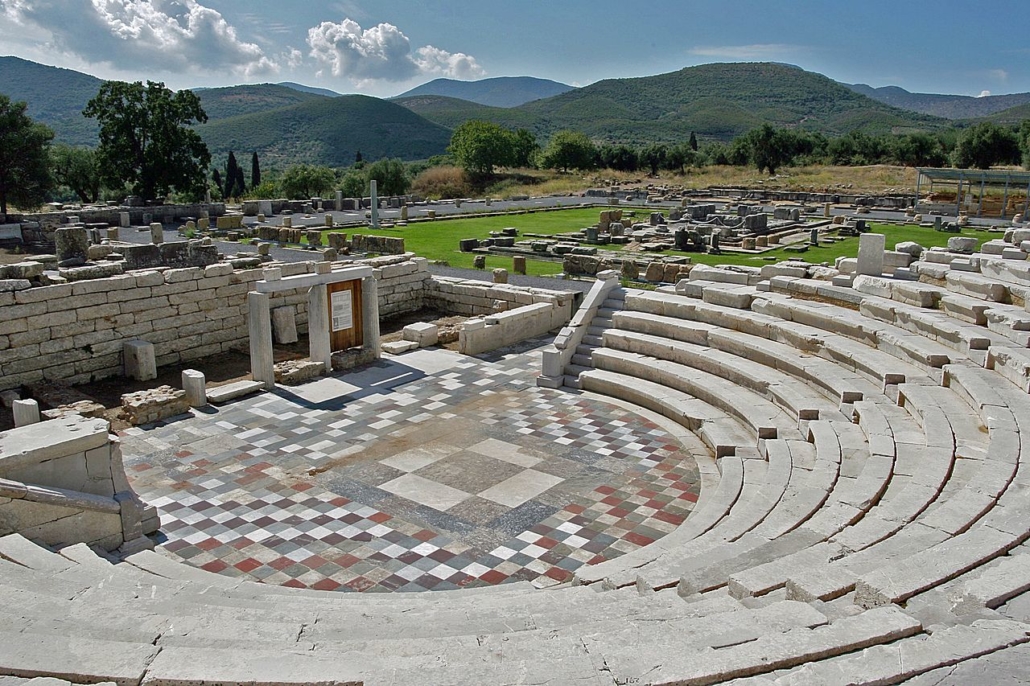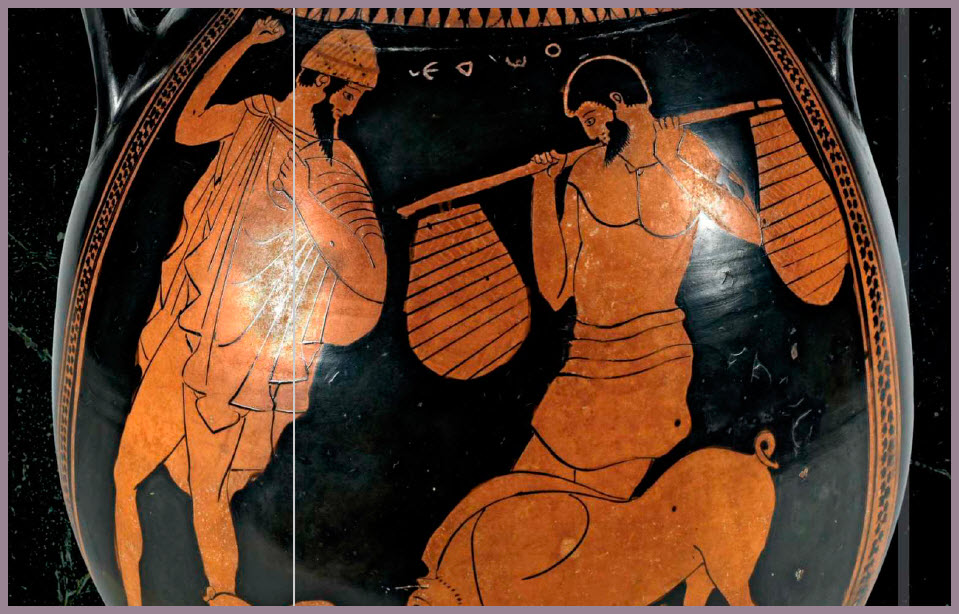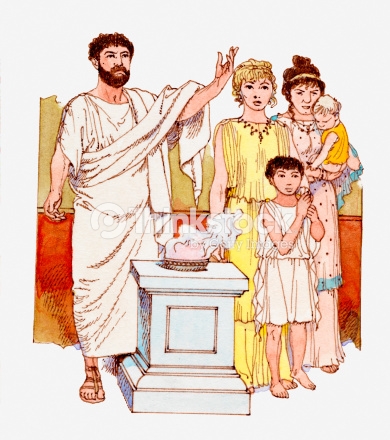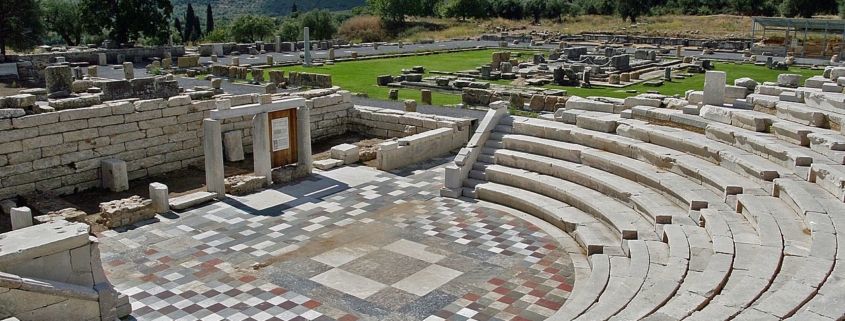Aristotle: The Biopolitics of the Citizen-State, Part 2

The ekklesiasterion, or assembly meeting place, of Messene, where civic debates were held
Aristotle’s Republic of Virtue
From these biopolitical premises, Aristotle wholeheartedly agreed with the communitarian ethos which the Greeks took for granted. As the philosopher explains: “the goodness of every part must be considered with reference to the goodness of the whole” (1260b8) and “a whole is never intended by nature to be inferior to a part” (1288a15). Indeed, Aristotle’s definition of a community-centered notion of justice may well be incomprehensible to many moderns: “The good in the sphere of politics is justice; and justice consists in what tends to promote the common interest” (1282b14). How many political discussions today — whether about abortion, gay marriage, immigration, economic policy, or whatever — refer to the common good rather than to solipsistic arguments about individual or sectoral ‘rights’ and ‘fairness’?
Aristotle is decidedly more ‘bourgeois’ and less spiritual than Plato. He has far less to say about the role of religion in the good society, this being practically an afterthought. He seems to hope for, at best, a stable and moderate regime, one respecting the interests of both rich and poor, founded upon an enlightened citizenry composed of independent landowners and responsible citizen-soldiers. But Aristotle also had an elevated notion of what politics should be about. In his own time, he contradicted those who believed that the state exists only as a kind of contract between individuals, meant only to guarantee their security or to enable them to chase after coin.
For Aristotle, man fulfills his nature as a rational being through philosophical contemplation and active citizenship. But only a minority have the intellectual gifts necessary to do this, and furthermore, as a practical matter, the work of servile subalterns is necessary to secure the necessary leisure to pursue philosophy and politics. Hence, Aristotle notoriously endorses a doctrine of natural slavery: barbarians and the morally defective are incapable of freedom and hence are only fit to be slaves of better men, thus enabling the latter to fulfill our human potential. Natural slaves are those who, either as individuals or as entire peoples, are so poorly endowed in reason that they may only participate in it as the servants of superior men. Aristotle observes: “what difference, one may ask, is there between some men and the beasts?” (1281b15). The recognition of inequality, enabling the creation of a just community and hierarchy, is no less central to Aristotle’s ethics and politics than those of Plato.
Aristotle advocates at least a kind of restricted democracy or constitutional government. He generally believes a large number of people should have citizenship, limited by service in the army and a moderate property qualification. He argues for a “mixed regime” featuring democratic, oligarchic, and aristocratic elements, subject to a largely unchanging basic law, the latter embodying and stipulating a way of life. Aristotle, like Plato, is greatly concerned with ensuring solidarity among the citizens, for he says that friendship (philia) “is the chief good of cities” (1262a40) and “seems to hold states together” (NE, 8.1). This friendly solidarity is guaranteed by both common ethno-cultural identity and by our more conventional notions of justice, namely reciprocity: “it is by proportionate requital that the city holds together” (NE, 5.6).
Aristotle is no egalitarian, even among the citizens. In his ideal state, a citizen’s participation in decision-making should be proportional to their goodness of character and their contribution to the community:
Those who contribute most to this association have a greater share in the city than those who are equal to them (or even greater) in free birth and descent, but unequal in civic excellence, or than those who surpass them in wealth but are surpassed by them in excellence. (1281a2)
The inegalitarian foundations of Aristotle’s thought are in practice moderated by his empiricism and pragmatism. We all should in principle agree that the best should rule. But as Aristotle notes: “it is not as easy to see the beauty of the soul as it is to see that of the body” (1254b27).
How then can we identify the best and ensure they come to power? There are no easy answers to this question.
As a partial solution, Aristotle’s ideal government, which he calls politeia (strangely, the generic word for civic government), grants citizenship only to those who would exercise their powers fairly moderately and wisely. His is a middle-class regime of citizen-soldiers, independent farmers, and family fathers, who have neither the conspiratorial tendencies of the rich nor the instability of the poor. Aristotle’s state seeks to give a critical mass of residents a stake in the perpetuation of the regime, with checks to represent the interests of each class, thus ensuring the rich are secure and the poor are treated reasonably. A degree of democracy is desirable for, Aristotle says, the people as a whole, including the elite, have more wisdom than does the elite alone.
It is significant that none of Aristotle’s arguments for moderate democracy are founded on ‘rights,’ but rather, are based on what benefits the community as a whole. Aristotle’s citizens rule and are ruled in turn, this reciprocity fostering a spirit of friendship between social classes. The soldiers in particular should have a say in the government for, as Aristotle observes, they guarantee the existence of the state.
Aristotle’s pragmatic and empirical approach is attractive. His empiricism leads him to reject any one-size-fits all solution: all the cities and peoples of the world being different, the regime suited to each will differ accordingly. A city with a truly exceptional royal family then might be rightly ruled by a king. A city with a vicious and uncultured population of working poor might be unfit for democracy.
Aristotle’s pragmatism also leads him to rejects communism. Already in ancient times, private property and economic inequality were sometimes blamed for the existence of immorality and social conflict. Aristotle’s arguments against communism and for private property regulated in the public interest have stood the test of time:
What is common to the greatest number gets the least amount of care. (1261b32)
[A]lthough there is a sense in which property ought to be common, it should in general be private. When everyone has his separate sphere of interest, there will not be the same ground for quarrels; and they will make more effort, because each man will feel that he is applying himself to what is his own. (1263a21)
Aristotle is clear however that private property is not a right enabling individuals to be as capricious and selfish as they please, but merely a sensible way of producing wealth, whose aim must ultimately be the well-being of the community.
Aristotle’s high-minded teleology conversely leads him to reject consumerism, capital accumulation, and usury as unnatural. Man should only acquire sufficient wealth to secure his livelihood and leisure as a rational being. Anything beyond this is unnatural. Usury, which abuses both the use of currency and man’s end, is then denounced:
The trade of the petty usurer is hated with most reason: it makes a profit from currency itself, instead of making it from the process which currency was meant to serve . . . of all modes of acquisition, usury is the most unnatural. (1258a35)[4]
For Aristotle, we should never lose sight of man’s nature and potential as a rational social animal.
The Enslavement of Barbarians

As we have seen, Aristotle believed that superior men required natural slaves in order to have the leisure necessary to engage in contemplation and civic life, and thus fulfill their nature as rational beings. This begs the question: who should be slaves? Those incapable of self-government.
Aristotle speaks of “foolish people . . . who by nature are thoughtless and live by their senses, are brutish, like some races of the distant barbarians” (NE, 7.5). Aristotle believed not only that certain individuals but entire peoples could be incapable of self-rule. And just as superior men should lead lesser men, so superior peoples should lead lesser peoples. Aristotle then recommends that barbarians be enslaved by Greeks. One should only caution here that it is not entirely clear whether Aristotle believes barbarian incapacity for self-government is entirely congenital or due to historical trajectory or geographical and climatic conditions.
One might dismiss Aristotle’s views as merely rationalizations for the chauvinism and unjust social system of his time. The ethics of slavery were already contested by many in his day and Aristotle may be accused of resorting to a chauvinistic compromise, reserving slavery for foreigners whom the Greeks had naturally less sympathy for.
The underlying principle is however an important one.[5] One should also remember that the Greeks were truly exceptional in their pursuit of reason and practice of citizenship, in stark contrast with the wild barbarism of northern illiterate tribes or the divinely-sanctioned despotism of Middle-Eastern god-kings. Aristotle is willing to give credit to the Carthaginians, a seafaring Semitic people, who had also developed a sophisticated civic government.
Aristotle asserts that neither the wild Europeans nor the slavish Asiatics were capable of self-rule, unlike the Greeks who represented a happy mean between the two. He says Asiatics are less attached to freedom than Europeans: “these barbarian peoples are more servile in character than Greeks (as the peoples of Asia are more servile than those of Europe); and they therefore tolerate despotic rule without any complaint” (1285a16). The Europeans however were still at a barbaric level of civilization, notably due to lack of communications and a harsh climate. Aristotle says:
The peoples of cold countries generally, and particularly those of Europe, are full of spirit, but deficient in skill and intelligence [or understanding, διάνοια]; and this is why they continue to remain comparatively free, but attain no political development and show no capacity for governing others. The peoples of Asia are endowed with skills and intelligence, but are deficient in spirit; and this is why they continue to be peoples of subjects and slaves. The Greek stock, intermediate in geographical position, unites the qualities of both sets of peoples. It possesses both spirit and intelligence, for which reason it continues to be free, to have the highest political development, and to be capable of governing every other people — if only it could once achieve political unity. (1327b18)[6]
The last line, dreaming of Greek unity and world-hegemony, betrays Aristotle’s powerful ethnocentric sentiment. The dream of course would be realized by the Kingdom of Macedon’s unification of most of Greece and Alexander the Great’s conquest of the enormous Persian Empire all the way to India. Aristotle, who served as Alexander’s tutor, is said by Plutarch to have advised the Conqueror to rule over the Greeks as peers and the barbarians as slaves (Plutarch, Moralia, 329b).
Aristotle’s principles also had implications for the morality of war. Certain peoples being incapable of self-government and the acquisition of slaves and territory through war being necessary for men to fulfill their nature as rational beings, Aristotle argued that war was a natural and potentially just activity:
[T]he art of war is in some sense a natural mode of acquisition. Hunting is a part of that art; and hunting ought to be practiced, not only against wild animals, but also against human beings who are intended by nature to be ruled by others and refuse to obey that intention, because that sort of war is naturally just. (1256b15)
All this will naturally shock the modern liberal sensibility. We must put Aristotle’s views in the context of their time and seek to separate what strictly belonged to those times and what is of enduring relevance. We would certainly not endorse, both for reasons of civil peace and of genetic integrity, reliance on foreign slaves in our lands. Furthermore, Aristotle explicitly states that if, by some magic, tools could operate themselves, slavery would be unnecessary:
We can imagine a situation in which each instrument could do its own work, at the word of command or by intelligent anticipation, like the statues of Daedelus or the tripods made by Hephaestus, of which the poet relates that of their own motion they entered the conclave of gods on Olympus.
A shuttle would then weave of itself, and a plectrum would do its own harp-playing. In this situation managers would not need subordinates and masters would not need slaves. (1253b23)
Aristotle then might well have conceded that in the age of automation the enslavement of foreigners is particularly unnecessary. There is also an important point of principle however. Insofar as a people legitimately is more enlightened and capable of reason than another — who perhaps is squatting on valuable resources — it follows from Aristotle’s argument that the better people has a natural right to claim them, by conquest.
Kinship and Household Rule

If family and kinship were of supreme importance to the ancient Greeks, they also hold a major place in Aristotle’s biopolitics at both the individual and collective levels. Citizens had a duty to respect their kin and form good families. The society as a whole was furthermore a group defined by kinship and was in fact an extended family. Aristotle perceptively observes that shared blood entails a common identity and is the cause of love within a same family:
Parents, then, love their children as themselves (for their issue are by virtue of their separate existence a sort of other selves), while children love their parents as being born of them, and brothers love each other as being born of the same parents; for their identity with them makes them identical with each other (which is the reason why people talk of ‘the same blood,’ ‘the same stock,’ and so on). They are, therefore, in a sense the same thing, though in separate individuals. (NE, 8.12)[7]
The common Greek view, and indeed this is a virtually universal view among humans, was that crimes are more heinous when committed against close kin. Aristotle says that assault, homicide, fighting, and slander “when they are committed against father or mother or a near relative, differ from offenses against people who are not so related, in being breaches of natural piety” (1262a25). Bringing harm upon one’s close kin was considered unnatural and impious.
Family and kinship play a fundamental role in Aristotle’s account of the emergence of society and politics. Aristotle believes that the first and simplest societies were families or households, as a family expanded into multiple households, these banded together into villages. The father rules the household by virtue of his kinship and experience, just as a king rules:
The first form of association naturally instituted for the satisfaction of daily recurrent needs is thus the family . . . The next form of association . . . is the village. The most natural form of village appears to be that of a colony [or offshoot] from a family; and some have thus called the members of the village by the name of “sucklings of the same milk,” or, again, of “sons and the sons of sons.” This, it may be noted, is the reason why cities were originally ruled, as the peoples of the barbarian world still are, by kings. They were formed of people who were already monarchically governed, for every household is governed by the eldest of the kin, just as villages, when they are offshoots from the household, are similarly governed in virtue of the kinship between their members. (1252b17)
Aristotle elsewhere defines the polis as “an association of households and clans in a good life, for the sake of attaining a perfect and self-sufficing existence” (1280b29).
Within households, Aristotle argues that the father’s rule is justified “because of the tie of blood and the benefits he confers; for the children start with a natural affect and disposition to obey” (NE, 10.9). The philosopher draws explicit analogies between the rule of the good father and of the good king:
The relation of the male to the female is permanently that in which the statesman stands to his fellow citizens [i.e., of near-equals]. Paternal rule over children, on the other hand, is like that of a king over his subjects. The male parent is in a position of authority both in virtue of the affection to which he is entitled and by right of his seniority; and his position is thus in the nature of royal authority. Homer was right, therefore, to use the invocation “father of gods and of men” to address Zeus who is king of them all. A king ought to be morally superior to his subjects, and yet of the same stock as they are; and this is the case with the relation of age to youth, and of parent to child. (1259a37)
The father’s household management, like that of the statesman, is not aimed at the accumulation of material wealth or honors, but towards the moral improvement of his family. Furthermore the tyrant, who does not rule legitimately, can nonetheless make himself more agreeable if he rules in “a spirit of paternal discipline” (1315a8). Thinkers throughout history have observed that political altruism can be achieved by, among other things, extending the feeling of familial solidarity to the society as a whole, something obviously infinitely easier to achieve if the members of that society are indeed kin.
The Greeks’ kinship circles extended from family, to clan, to city, to all of Greece herself. While every citizen owed loyalty to their family and their city-state, the common Greek identity was cultivated through sporting events and religious festivals, and there it was understood that Greeks owed each other a duty, very imperfectly followed, of fighting together against barbarian invaders. Here again, Aristotle is typical of the Greeks.
Finally, there is a tendency in Greco-Roman philosophy towards a kind of universal kinship, all men being thought of as related, both in a limited biological sense, and in sharing in reason and thereby a kind of kinship with the divine. The idea that man ought to follow nature and reason, both of which are universal, was increasingly interpreted as meaning one ought to be a citizen of the world, a cosmopolitan.
However, Aristotle’s philosophy of eudaimonic and naturalist ethics rejected such conclusions. For him, reason, and in particular the political exercise of reason through citizenship, was only possible within the confines a particularistic and exclusionary polis. Though nature and reason are universal, human beings can only exercise that reason in particular communities, which firstly must have the natural endowment necessary for reason, and secondly must have sufficient kinship ties and identity to enable the solidarity necessary for reciprocal citizenship. Insofar as a cosmopolitanism ignores the diversity and inequality of men, this undermines both the real foundations for the solidarity necessary to active citizenship and the achievement of the highest human potential. This, for Aristotle would have been unnatural and unethical.
End of Part 2.






Thank you for the exposition. Most interesting and much appreciated.
Whew…, what a mouthful, so to speak !
So many possibilities.
Which way Western Man in deed ?!
Somewhere in this interesting two part series, there is reference to a premonition of automation in the future where human labour is no longer required.
Interestingly enough, as a planet, man is tending in this direction.
However, as automation and mass production increase, quality decreases.
This leads one to speculate on the limits of vision of these two philosophers at the time.
Today, almost anyone can get information about any part of the world in a flash.
Satellites and distant Planets have been landed upon and newly discovered.
The sun has been probed.
It seems as if the trend is upward and ever outward.
However, beyond environmental disaster or which form of government, the usurious Jew…,
in his quest to own everything and wallow in carnal lust…,
is actually the greatest threat to both planetary life and all that the Greek philosophers sought.
There is no doubt in my mind that any serious attempt to try and prevent the usurious Jew from continuing on the tyrannical path he has chosen, will result in a radioactive contamination of the entire earth.
I do not think it necessary at the present time to ponder questions like;
“Who is fit to lead?”,
“Who should be allowed to vote?”
“Who should be slaves?”
“Should the retarded be allowed to breed?”
and so forth.
In a world with Jewish malfeasance, even if these questions were answer, there is little hope that they would be realized.
First question to ask is;
“How best to get the world to unite in unraveling the Jewish Python that squeezes tighter with every breath we exhale?”
After this question has been solved, I have a feeling that the planet’s natural order and rhythm will reassert itself and the questions above will become mute.
With todays technology and resources,
deserts and rocky volcanic outcrops can be made into lush forests flush with wildlife.
Blacks can be sent to their native lands and taught how to clean them up.
Clonal architectural and sterile living conditions can be turned into vast seas of communal organic gardens or inner city wildernesses.
Depleted sea stocks, like West Coast Salmon, can be given a chance to recover.
In short, the usurious deviances that are now being channeled into wars for Satan’s Israel, can be diverted into raising the quality of life and putting the planet on a broader, consensual mission where every race, in deed, every form of life, can play a role.
Roy A. stated:
“… there is reference to a premonition of automation in the future where human labour is no longer required.
Interestingly enough, as a planet, man is tending in this direction.
However, as automation and mass production increase, quality decreases.
This leads one to speculate on the limits of vision of these two philosophers at the time.”
Thanks, Roy.
Principles, theories, etc. But ultimately it all rests on biology. There is no people weaker and more doomed than those who can’t do things for themselves – except for those who use cunning, of course.
There is, in the natural world and in the man-made world, a place for hyenas, vultures and parasites. These predators simply don’t attack anyone or anything at random – neither individuals nor nations – who is tough and intelligent in every way, people who don’t see a life of ease with its satisfaction of every little urge as some sort of worthy goal.
Are we white people really all that smart? Yes, we came up with Smart phones, Smart televisions, Smart cars, even Smart homes FFS. But how stupid we are in the important ways. Before we can recognize and deal with our enemies, we need to produce intelligent people from the ground up. And I don’t mean fiddling with genes, which is just More of the Same Crap.
The swing of the pendulum within the turn of the spiral as it ascends and descends: this mess we are in was surely predicted by certain parties with a long view.